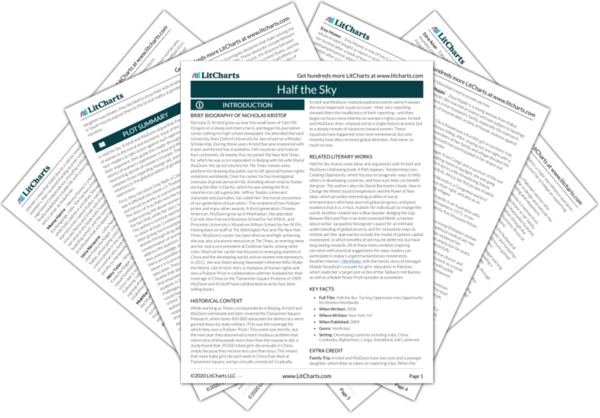“Women’s issues” don’t hold international attention in the way that terrorism and other “serious issues” do. But, Kristof and WuDunn argue in Half the Sky, women’s issues are humanitarian issues—just as the Holocaust was not a Jewish crisis, but a human crisis—and shouldn’t be marginalized. The authors also show that when women and girls are held back, it doesn’t just affect women. Rather, whole societies suffer. Kristof and WuDunn argue, then, that women’s empowerment doesn’t just serve women, it serves all of society in profound ways.
Put another way: the author’s argue that the cause of empowering women is not just a moral one, but pragmatic one. They make the make the case that much is at stake—economic growth, public health, education, and more—if women don’t advance globally, and much will be gained if they do. For instance, the authors show how educating girls has tremendous economic benefits. When girls have access to schools, they’re better able to enter the workforce, which leads to a rise in their country’s GNP (gross national product). Women’s education also unlocks intelligence that was formerly uncultivated, which can lead to new innovation, sometimes called “the girl effect.” As Bill Gates said at a technology conference in Saudi Arabia, “If you’re not utilizing half the talent in your country, you’re not going to get to the top ten [in technology].” Further, the authors show that when women control household money, they tend to spend more wisely than men, choosing education and investment opportunities over goods like alcohol and tobacco. And, from such “deferred consumption,” the whole household wins. The book also explains how female political participation brings good for everyone. Though women in office aren’t necessarily more empathetic or peacemaking than men, they tend to pay more attention to local infrastructure and community needs. Likewise, women’s voting rights have historically redirected political issues. For instance, women’s suffrage in the U.S. led to an 8-15% decline in child mortality (death of children under five), showing that once women gained sway in the polls, their priorities rose on the agenda.
The author’s augment their claim about the pragmatic benefits of empowering women by showing how significant parts of the business world – the ultimate pragmatists – concur: the investment firm Goldman Sachs, for instance, reports that, “Gender inequality hurts economic growth.” By presenting the issue of the oppression of women as one that affects entire communities and countries, that effects not just women but GNPs and global business, the authors make clear that gender equality is not just a niche cause reserved for non-profits, but a global necessity deserving serious and sustained attention.
Universal Benefits of Women’s Empowerment ThemeTracker

Universal Benefits of Women’s Empowerment Quotes in Half the Sky
That is the power of education. One study after another has shown that educating girls is one of the most effective ways to fight poverty. Schooling is also often a precondition for girls and women to stand up against injustice, and for women to be integrated into the economy. Until women are numerate and literate, it is difficult for them to start businesses or contribute meaningfully to their national economies.
It is not uncommon to stumble across a mother mourning a child who has just died of malaria for want of a $5 mosquito bed net and then find the child's father at a bar, where he spends $5 each week. Several studies suggest that when women gain control over spending, less family money is devoted to instant gratification and more for education and starting small businesses. Because men now typically control the purse strings, it appears that the poorest families in the world typically spend approximately ten times as much (20 percent of their income on average) on a combination of alcohol, prostitutes, candy, sugary drinks, and lavish feasts as they do on educating their children.
The unfortunate reality is that women’s issues are marginalized, and in any sex trafficking and mass rape should no more be seen as women’s issues than slavery was a black issue or the Holocaust was a Jewish issue. These are all humanitarian concerns, transcending any one race, gender, or creed.
Think about the major issues confronting us in this century. These include war, insecurity, and terrorism; population pressures, environmental strains, and climate change; poverty and income gaps. For all these diverse problems, empowering women is part of the answer. Most obviously, educating girls and bringing them into the formal economy will yield economic dividends and help address global poverty.
















